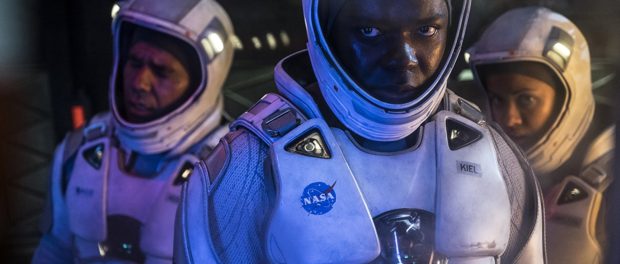Review: The Cloverfield Paradox
Not gonna lie, it’s a cool idea wanting to release a film right after the Super Bowl is over. It was very exciting when Paramount announced that the Cloverfield series was getting a new instalment, The Cloverfield Paradox, but it was unexpected to find out it was going to be released on Netflix. It’s directed by newcomer director Julius Onah, while still being produced by J. J. Abrams. The first film, simply titled Cloverfield, was stylized to be like a found footage horror flick, and 10 Cloverfield Lane felt like an intense and intriguing psychological thriller. This time, The Cloverfield Paradox is now in the science-fiction genre. They all take place in the same universe, but at this point they just feel like stand-alone anthology films. It doesn’t really matter whether or not you watch them in chronological order.
Set in the year of 2028, Earth is going through an energy crisis, and scientists have to figure out a way to save their planet. While they’re willing to use their particle accelerator aboard the Cloverfield Station in space, they are also about to face some severe consequences that would change their lives forever.
It has some great actors such as David Oyelowo and Daniel Brühl, but unfortunately they don’t really stand out. Since their characters are bland at times, it’s kind of hard to root for them. While filming on set, they probably knew it was going to be a box office flop if it was released theatrically. However, Gugu Mbatha-Raw is the best part of the movie. She carries the film with her great performance, and is only the memorable character compared to the rest of the ensemble. Her backstory, however, is a little clichéd, and the audience will simply not care for it.

The Cloverfield Paradox.
Unfortunately, Mbatha-Raw’s performance alone isn’t able to save the film. The main problem with The Cloverfield Paradox is that it’s incredibly convoluted and messy. Throughout the movie, it tries to be so big with its premise that it loses focus. Exposition is heavily noticed from beginning to end, and it seems like the scriptwriter Oren Uziel thought the audience will be too stupid to understand what’s happening. There’s a huge difference between being complex and being convoluted, but it seems like the film couldn’t handle the muddled script. It’s quite disappointing that the audience will not care about the human race’s desperation for survival, which takes away all the intensity.

The Cloverfield Paradox.
The marketing strategy for this film is undeniably clever, putting a commercial for The Cloverfield Paradox during the Super Bowl, and announcing that it’s going to be released when the big game is finished. Unfortunately, it is the weakest from the series. While the introduction did a decent job setting up the sci-fi vibe of the film, the rest of it is just incredibly messy. The audience can easily tell it feels like a straight-to-dvd movie, and it doesn’t really deserve a theatrical release. If you’re a huge fan of the franchise, this might be a huge disappointment for you.
The Cloverfield Paradox is now streaming on Netflix.
2 Comments on Review: The Cloverfield Paradox
Comments are closed.







Thank you. We believe we made our point.
Steven Lee, thank you for this post. Its very inspiring.